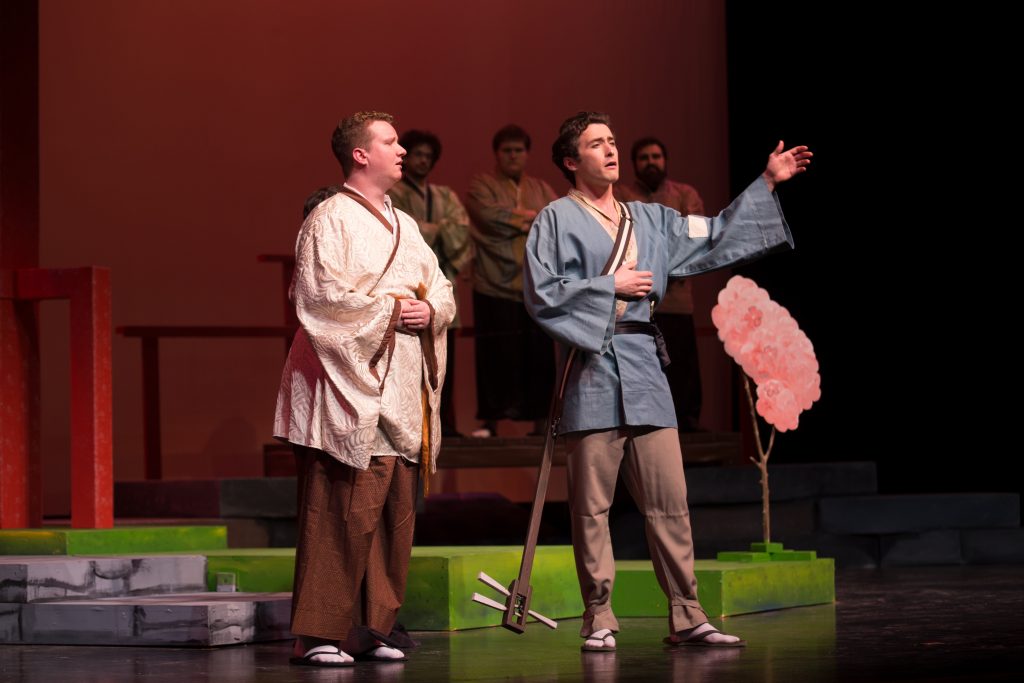
Giggling girls, farcical stage combat and jabs at President Donald Trump: Welcome to the wild world of “The Mikado.”
Binghamton University’s music department joins with the Summer Savoyards, a local theatre group, to perform the three-hour opera-comedy this weekend.
“The Mikado,” an operetta by famed duo William Gilbert and Arthur Sullivan (“H.M.S. Pinafore,” “Pirates of Penzance”), debuted in London in 1885. The show ran for 672 consecutive performances, making it one of the longest-running pieces of theatre in history at the time.
The Summer Savoyards has been performing the works of Gilbert and Sullivan since its founding in 1961. The nonprofit organization has performed all of Gilbert and Sullivan’s operettas. This is the first joint venture between the BU music department and the Savoyards.
The show follows the entangled and complicated lives of those in power and those lost in love in the fictional Japanese town of Titipu.
Since its debut, “The Mikado” has remained one of the most popular operettas of its kind, inspiring performances all over the world at the high school, community and professional level.
Something that makes “The Mikado” desirable for performers is that the score includes two patter songs. Made famous by Gilbert and Sullivan, the patter song consists of wildly fast tempos and tongue-twisting lyrics.
Professor Timothy Perry, director of the University Symphony and Chamber Orchestras and conductor of “The Mikado,” explained that a hallmark of Gilbert and Sullivan renditions is the opportunity to write new lyrics into these patter songs.
“These [modern versions] have traditionally become avenues for people to make comments on their present condition,” Perry said.
Perry also said that the creative lyric changes make “The Mikado” an exciting show to follow.
“Even if you’ve seen ‘Mikado’ before, these two famous, famous songs are going to have stuff that you’ve never heard before,” Perry said.
The rewrites of the patter songs in BU’s production of “The Mikado” poke fun at the trivialities of today’s pop culture, including Twitter, selfies and Snapchat.
One song also draws comparisons between the U.S. political climate of today — “orange chauvinist, he won’t be missed” — with the British authority of the late 19th century, when the opera was written.
Dylan Ruffo, chair for the executive board of the Summer Savoyards, said that Gilbert and Sullivan wrote “The Mikado” as a satire of Britain’s obsession with Japan during the Restoration.
“The British were absolutely obsessed with anything and everything Japanese, and collected things like fans and swords to display in their homes,” Ruffo wrote in an email. “However, they had no real understanding of the intricate culture of Japan.”
With this heavy satire, “The Mikado” is often criticized as being racist, as it often features white actors adorning themselves in traditional Japanese garb. Some productions have featured actors in yellowface.
Ruffo argues that the interpretation of the show as racist stems from a misunderstanding of the circumstances of the time.
“Gilbert was not a dumb man,” Ruffo wrote. “He knew what he was doing. Just like the other Savoy Operas in the Gilbert and Sullivan canon, the main function of this work is to poke fun at British aristocracy.”
According to Ruffo, fans of the opera can expect its usual antics with twists and turns, and newcomers to the show should prepare to be entertained.
“You cannot walk away from a production of The Mikado without humming the tunes, or laughing at the jokes for a few days after the performance,” Ruffo wrote.
“The Mikado,” with stage direction by Steven Nanni and John Isenberg, a local director and a BU music department faculty member, respectively, will run in the Anderson Center’s Chamber Hall on Friday at 7:30 p.m., and Sunday at 1 p.m. Tickets are $10 for BU students and $20 for adults.
For tickets, call (607) 777-2787, or visit anderson.binghamton.edu.


